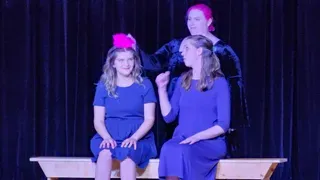September 24, 2013
The Jungle Book
Robert Nesti READ TIME: 5 MIN.
The jaunty hit tune from "The Jungle Book," Walt Disney's final film during his lifetime, is "The Bare Necessities" - a lesson taught young Mowgli, the "man-cub" raised by jungle animals. Of course the song (with its less-is-more attitude sung by a bear named Baloo) turns up in the stage version, having a premiere at the Huntington Theater Company under the wondrous direction of Mary Zimmerman.
What's surprising is that the song turns out to be the mantra for her handsome production, which uses a theatrical style that would have been right at home on a London stage during Rudyard Kipling's lifetime. (Kipling's stories, published in 1897 under the title "The Jungle Book," were the basis for the 1967 Disney film and this musical.) No lasers, no elevators raising mountains out of the floor, no flying monkeys; instead Zimmerman tells the story through the simplest of theatrical means.
That's not to suggest it isn't lavish: Set designer Daniel Ostling provides a jungle world that seems a cross between a Henri Rousseau canvas and a delirious Vogue fashion spread. In Ostling's designs, the Indian jungle is brilliantly brought to life with floral fabrics, bold lighting and imaginative props (such as a twenty-foot snake whose body weaves above and below the stage through trap doors). Add to it the costumes (by Mara Blumenfeld) that suggest the animals the actors are impersonating - from peacocks and vultures to elephants and monkeys, with distinctive, understated wit.
But what Zimmerman does so well is create an organic whole - fusion is a word that's been overused to describe a blending of elements, but it applies to this production, which takes such disparate elements (as Broadway-styled production values, jazz and authentic Indian music) and puts them together to spectacular effect. The piece itself has charm, but it is also woefully underwritten, especially in creating a narrative through-line.
The first half, which begins dramatically enough with Mowgli's rescue from Shere Khan (the menacing tiger that wants the boy for breakfast) and the pact the panther Bagheera makes to save the boy from death, dissolves into a loosely-knit series of scenes where the boy talks (and hangs out) with the animals. These include an eye-filling contingent of elephants decked in Raj regalia; monkeys that kidnap Mowgli thinking he can bring them fire (or the "red flower," as they call it); and the aforementioned bear that is accompanied with a roving jazz band for the show's biggest tune. As Baloo, Kevin Carolan is a hilarious sight in a costume with wooden rings that appear to orbit his body and, he gives the number a full-bodied delivery that's sweetly exuberant.
As the credits suggest, the score, taken from the film, is written by a committee (music and lyrics by Richard M. Sherman and Robert B. Sherman, additional music and lyrics by Lorraine Feather and Paul Grabowsky), and it is serviceable at best. What makes it effective in this production is how musical director Doug Peck re-imagines the songs with elements of American and Indian music. It is not surprising to hear Andr� de Shields (in a show-stopping turn as the leader of some over-stimulated monkeys) scat sing in the exuberant first act finale or a red-garbed musician sitting on the edge of the stage with a sitar. It's a world music blend, and Peck's talented contributions give the piece a thematic integrity unusual for a musical of this sort.
What works best about this "Jungle Book" is how brilliantly it integrates adult themes in what is essentially an entertainment aimed at children. (In this way it recalls the masterful animated film "Toy Story 3," which dealt with a lot more than just the adventures of animated toys.) After the slight first act, the second returns to the central plot element: Shere Khan's attempt to capture Mowgli and kill him. The droll Larry Yando (as Shere Khan) delivers a chilling reminder of mortality in his second act solo before facing his doom in an unexpected epiphany replete with Indian gods dropping from the heavens. It's heady stuff, but Zimmerman's staging of this moment gives "The Jungle Book" an unexpected emotional heft. Just this moment alone makes this production worth seeing, if only for the way it brings a spiritual element to a colorful, if anecdotal musical adventure. In this way it recalls another terrific musical - "Once On This Island" - as it introduces adult themes in what is, essentially, a children's entertainment.
At the opening night Akash Chopra as Mowgli was a joy to watch. (Chopra shares the performing duties with Roni Akurati.) He centers the show with his buoyant enthusiasm as he moves from adventure to adventure. He is so in the moment that he doesn't appear to be acting at all.
As his protectors, Usman Ally and Kevin Carolan bring differing temperaments to their roles: Ally has a refined dignity as the panther instrumental to Mowgli's survival, while Carolin plays it for laughs. Both are excellent. Thomas Derrah brings slinky intensity to his portrayal of a twenty-foot snake (cleverly evoked as a puppet). He gets a moment in a seductive number that recalls, of all things, a Busby Berkeley dance routine. Larry Yando offers the most sophisticated turn as Shere Khan, an approach that pays off in a climatic sequence that resonates far more than anything in "The Lion King."
No doubt comparisons are in order to that Disney juggernaut, but what Mary Zimmerman's inspired work does here is show that so much more can be made from so much less. Stagecraft is king in this beautifully rendered production.
"The Jungle Book" continues through Oct. 20, 2013 at the B.U. Theatre, 264 Huntington Avenue, Boston, MA. For more information visit the Huntington Theatre website.
Robert Nesti can be reached at [email protected].





